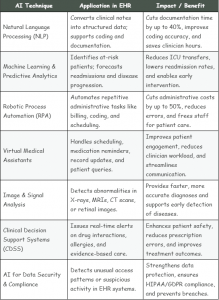In the coming years, AI-powered EHRs could shift the balance, allowing doctors and nurses to spend less time on clicks and more time focused on patient care.
Artificial intelligence (AI) is being adopted across industries globally, and healthcare is no exception. With its ability to analyze vast amounts of data and uncover hidden patterns, AI has become a powerful force with the potential to transform medical practice. Once the cornerstone of healthcare, Electronic Health Records (EHRs) are now being revolutionized by this technology. So, how is AI transforming EHRs? What challenges does it solve? And what innovations are driving this change? Let’s explore.
The Current Challenges of EHRs and the Need for Change
Electronic Health Records (EHRs) were initially developed to simplify the collection, storage, tracking, and sharing of patient information. However, despite their clear benefits, many healthcare professionals view EHRs as more of a daily burden than a helpful tool. A major concern is the administrative workload—doctors, on average, spend an extra two hours each day on documentation. This has fueled strong support for integrating AI into EHRs to alleviate these challenges.
Interoperability remains a significant challenge. While sharing information between healthcare institutions should be straightforward, a Tebra report reveals that 69% of providers frequently face major interoperability issues between their EHR systems and those of other practices or healthcare organizations. This poor communication can result in duplicated tests, treatment delays, and potentially put patients at risk.
Additionally, patient satisfaction often declines due to slow updates or conflicting records that disrupt care delivery. When patient information is fragmented, doctors spend excessive time reconstructing medical histories, which can undermine patient trust in the healthcare system. Despite these challenges, EHRs remain essential to modern healthcare. With AI technology, however, they offer new possibilities. Housing vast amounts of both structured and unstructured medical data, EHRs provide a strong foundation for AI to drive meaningful improvements.
How AI Can Transform EHRs
AI has the potential to revolutionize Electronic Health Records in numerous ways. Rapid advancements in AI technology are driving the development of innovative tools that enhance EHR systems and improve healthcare as a whole. Understanding these applications is key to recognizing how automation can strengthen the healthcare system. Here’s how hospitals are leveraging AI to upgrade their EHRs:
Natural Language Processing (NLP)
Clinical documentation is one of the most time-intensive tasks for healthcare providers. NLP technology can interpret and organize free-text data—such as doctors’ notes or discharge summaries—automatically. Instead of physicians manually entering all information, NLP-powered systems extract key details and convert them into structured data within the EHR.
Hospitals using medical NLP tools, including speech-to-text dictation and note summarization, have significantly reduced documentation burdens. Such automation can cut paperwork time by up to 40%, effectively returning about 20 minutes to every clinical hour. This translates to more direct patient interaction and less time spent on computers. Early NLP implementations have also boosted physician satisfaction and helped reduce burnout.
Machine Learning and Predictive Analytics
Machine learning uses algorithms to detect patterns and trends in large datasets. This allows AI tools to analyze past data and identify patients at risk for readmission, heart attacks, sepsis, or worsening chronic conditions. Hospitals using machine-learning-based early warning systems have seen fewer intensive care transfers and significant cost savings. These predictive capabilities transform EHRs from passive record-keepers into active contributors to patient care.
Robotic Process Automation (RPA)
AI-powered robotic process automation helps streamline tasks like billing and scheduling. Hospitals that have adopted RPA report cutting administrative costs by up to 50%, freeing clinical staff to focus more on patient care. This shifts EHRs into operational partners that reduce workload and improve non-clinical processes.
Virtual Medical Assistants
Virtual assistants are widely used across industries, and in healthcare, they serve many roles. They help manage appointments, send medication reminders, update records automatically, and even handle patient inquiries—making care more efficient and accessible.
Image and Signal Analysis
Deep learning algorithms have transformed diagnostic capabilities by analyzing imaging data stored in EHRs. Tools like Google’s DeepMind have achieved impressive diagnostic accuracy, assisting clinicians in detecting conditions such as glaucoma and retinal diseases. When integrated into EHR systems, these AI models can automatically flag abnormal scans, reducing diagnosis delays and aiding clinical decision-making.
Clinical Decision Support Systems (CDSS)
AI has enhanced clinical decision support within EHRs. Modern systems can review medication orders, alert physicians to potential drug interactions, and provide evidence-based guidelines. These features help prevent prescription errors and improve treatment safety. Rather than overwhelming providers with alerts, AI prioritizes notifications based on clinical importance.
Data Security and Compliance
Healthcare continues to face a high volume of cyberattacks. In April 2025, Check Point Research reported an average of 2,309 attacks per week on healthcare organizations—a 39% increase from the previous year—with breaches causing damages up to $10 million. AI-powered anomaly detection plays a critical role in protecting EHRs by identifying suspicious activities in real time. This helps healthcare organizations strengthen compliance with regulations like HIPAA and GDPR. Hospitals using AI-driven monitoring can detect threats earlier and respond faster, minimizing breaches that risk sensitive patient data.
Essential AI Techniques in EHRs and Their Effects

Challenges in Adopting AI in EHRs
While AI holds tremendous potential to improve healthcare systems, overlooking the challenges and risks it brings can lead to unintended consequences. To ensure successful adoption, several key issues must be addressed:
Bias and Fairness in AI Models
AI systems don’t think like humans and depend entirely on the data they’re trained on. If training data lacks diversity, AI tools may produce biased results. For instance, models trained predominantly on data from one demographic may perform poorly for others. Given current technology, this risk is almost unavoidable, making it crucial to continuously update datasets and ensure they are as diverse and representative as possible.
Integration Complexity
Many hospitals already use established systems like Cerner and Meditech. Integrating AI into these existing platforms can be costly and complicated due to the need for customization. Issues like incompatible formats, disorganized system architectures, or data loss may arise. Without careful planning, AI implementations risk adding complexity instead of streamlining workflows.
Clinician Acceptance and Training
For AI to succeed in EHRs, clinicians must trust the system’s recommendations. However, many worry that AI could threaten their professional roles or add to their workload. Moreover, existing staff often require additional training to effectively use AI tools, as they may lack the necessary skills. It’s essential for clinicians to understand the benefits AI offers so they can embrace these technologies rather than resist them.
Conclusion
AI has the potential to address many of the well-known challenges of EHR systems. Early achievements with NLP and predictive analytics demonstrate that smarter EHRs can improve patient outcomes by identifying issues earlier, while also easing clinicians’ workloads by automating routine tasks and documentation. Nevertheless, concerns around privacy, bias, and user trust must be continually managed as these technologies are adopted. The coming years could be a turning point where doctors and nurses spend less time on administrative tasks and more time focused on patient care, thanks to AI-powered EHRs.


































